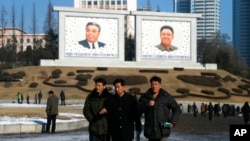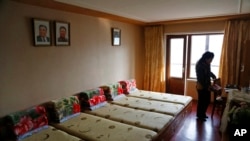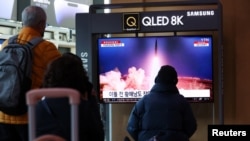By the time he was 12 years old, North Korean defector Joseph Kim had seen his father starve to death, his sister sold to a man in China, and his mother imprisoned. Left alone, he begged, stole and worked in coal mines to survive.
“Even though North Korea is a dark place, it is still my home and home to 25 million North Korean people today,” Kim said. “North Korea is a land with darkness, not a land made of darkness.”
This was his message to an informal meeting of the U.N. Security Council on Friday, intended to show the link between North Korea’s human rights abuses and its illegal nuclear and ballistic missile programs.
SeoHyun Lee defected with her family in 2013. Until then, she said, she led a life of relative privilege as her father was a high-ranking government member.
“Being a part of the elite, ironically, meant you are heavily scrutinized, monitored or punished,” she said.
Lee said the regime monitored her family’s telephones around the clock. She said she learned at a young age to control her curiosity and thoughts for the sake of her and her family’s safety.
In 2010, living as a student in China, she began to gain awareness of the situation in her country. She told the meeting that most North Koreans do not fully comprehend the extent of the oppression they live under.
North Korean leader Kim Jong Un and his family were “able to build nuclear weaponry with no resistance from the North Korean public, while thousands of the people starved to death, because they have never learned about the concept of human rights, so they didn’t understand their human rights were violated,” Lee said. “Even if some do understand, they are held hostage by guilt by association and systematic oppression.”
U.S. Ambassador Linda Thomas-Greenfield, who co-hosted the meeting with her counterparts from Japan, South Korea and Albania, said for every defector’s story, there are “countless” others that are never heard.
“This, of course, is by design. The regime in Pyongyang does everything in its power to hide its atrocities from the outside world. But time and time again, they have failed,” she said.
China, Pyongyang’s closest ally, blocked the broadcast of Friday’s meeting on the U.N. website, but it could be seen on some internal building feeds, and the Albanian delegation streamed it live on its Facebook page. The Chinese also objected to the holding of the session, saying it was not constructive in any way.
“Instead of easing tension, it may rather intensify the conflict and therefore is an irresponsible move,” said counsellor Xing Jisheng.
Crimes against humanity
North Korea’s human rights abuses are well known. The U.N. Commission of Inquiry (COI) and other independent human rights experts have documented testimony from hundreds of defectors.
In 2014, the COI found that North Korea’s violations had risen to the level of crimes against humanity. Among them the report found: “extermination, murder, enslavement, torture, imprisonment, rape, forced abortions and other sexual violence, persecution on political, religious, racial and gender grounds, the forcible transfer of populations, the enforced disappearance of persons and the inhumane act of knowingly causing prolonged starvation.”
Thomas-Greenfield said the connection between the regime’s rights abuses and its threat to global collective security could not be clearer.
“In the DPRK, the pursuit of weapons always, always trumps human rights and humanitarian needs of its people,” she said, using the abbreviation for the country’s official name, the Democratic People’s Republic of Korea.
"The regime’s use of forced labor drives their unlawful weapons program forward,” she said. “Food distribution policies favor the military at the expense of more than 10 million North Koreans who are food insecure.”
North Korea’s obsession with its WMD program was underscored by its latest intercontinental ballistic missile launch on Thursday.
In a statement Friday, North Korea blamed the tense situation on the Korean Peninsula on joint military exercises that the United States and South Korea carry out. It said Pyongyang launched the ICBM under the guidance of leader Kim Jong Un to confirm the operation and reliability of its “nuclear war deterrent” and to “strike fear into the enemies.”
U.N. Secretary-General Antonio Guterres condemned the latest launch and reiterated his calls for North Korea to immediately stop taking destabilizing actions, comply with its international obligations, and resume dialogue that could lead to sustainable peace and the complete and verifiable denuclearization of the Korean Peninsula.







